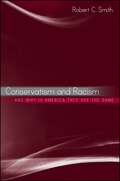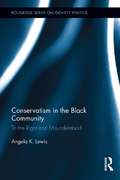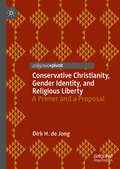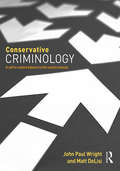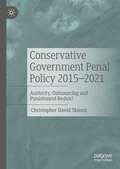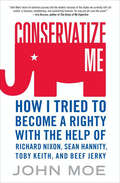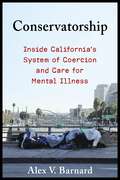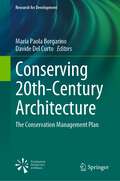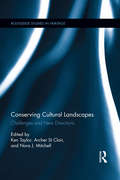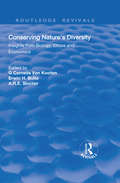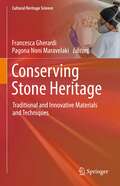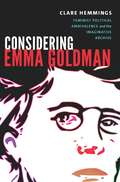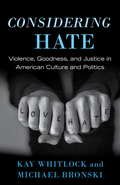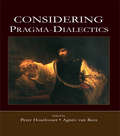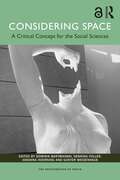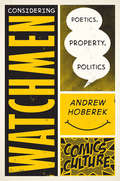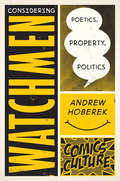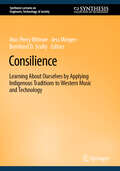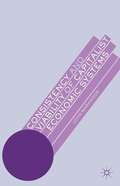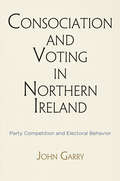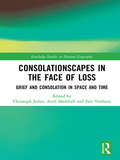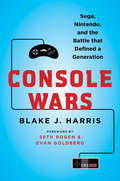- Table View
- List View
Conservatism and Racism, and Why in America They Are the Same (SUNY series in African American Studies)
by Robert C. SmithIn this provocative, wide-ranging study, Robert C. Smith contends that ideological conservatism and racism are and always have been equivalent in the United States. In this carefully constructed and thoroughly documented philosophical, historical, and empirical inquiry, Smith analyzes conservative ideas from John Locke to William F. Buckley, Jr., as well as the parallels between the rise and decline of the Civil Rights Movement in the 1950s and 1970s and the ascendancy of the conservative movement to national power in 1980. Using archival material from the Reagan library, the book includes detailed analysis of the Reagan presidency and race, focusing on affirmative action, the Voting Rights act, the Grove City case, welfare reform, South Africa policy, and the Martin Luther King, Jr. holiday. Conservatism and Racism, and Why in America They are the Same goes beyond a focus on the right wing, concluding with an analysis of the enduring impact of the conservative movement and the Reagan presidency on liberalism, race, and the Democratic Party.
Conservatism in the Black Community: To the Right and Misunderstood (Routledge Series on Identity Politics)
by Angela K. LewisConservatism in the Black Community examines the contemporary meanings of Black Conservatism and its influence on black political behavior, providing a basis for understanding the impact this phenomenon has on black political behavior. Lewis analyzes conservatism within the black ideological framework, while also explaining the meaning of conservatism in the black community. While scholars have argued that the level of support for conservatism among blacks is minimal because conservatism is antithetical to black interest, there are a cadre of conservative political intellectuals and political elites in America. Do their views influence those of the wider Black population? Or does the media merely amplify their voices but with little support? What part of contemporary Black conservatism has found a home in the Tea Party movement? Focusing on what conservatism means to Blacks at the grassroots level and in what issue areas Blacks as a whole tend to have more conservative views, this work neither critiques nor praises Black Conservatism. The results of Lewis’s mix of quantitative and qualitative methodologies will be of strong interest to students and scholars of Black politics, Black studies, and political behavior more generally.
Conservative Christianity, Gender Identity, and Religious Liberty: A Primer and a Proposal
by Dirk H. de JongThis book explores the intersection of conservative Christian values and contemporary theories and expressions of gender identity, i.e. transgender and genderqueer identities. More specifically, it examines the conflict between beliefs about religious liberty and transgender rights. It also proposes a pluralistic morality, allowing for both faith-based values and scientific discoveries about gender to resolve that conflict. Along the way, Dirk de Jong explores various contextual issues: The increase in the number of people who identify as trans or nonbinary, the differences between biblical and queer conceptualizations of gender, the impact of religious freedom policies on transgender rights, the controversy around Title IX exemptions in higher education, the emergence of trans advocacy in conservative Christian communities, and the role of dialogue in social transformation efforts with respect to gender.
Conservative Criminology: A Call to Restore Balance to the Social Sciences
by John Wright Matt DeLisiConservative Criminology serves as an important counterpoint to virtually every other academic text on crime. Hundreds of books have been written about crime and criminal justice policy from a variety of perspectives, including Marxist, liberal, progressive, feminist, radical, and post-modernist. To date, however, no book has been written outlining a conservative perspective on crime and criminal justice policy. Not a polemic against liberalism, Conservative Criminology nonetheless focuses on how liberal ideology affects the study of crime and criminals and the policies that criminologist advocate. Wright and DeLisi, both senior scholars, give a voice to a major political philosophy—a philosophy often demonized by academics—and to conservatives in the academic world. In the end, Conservative Criminology calls for an investment in intellectual diversity, a respect for varying political philosophies, and a renewed commitment to honesty in scholarship. The authors encourage debate in the profession about the proper role of ideology in the academy and in public policies on crime and justice. Conservative Criminology is for the criminal justice professional and student. It serves as a stimulating supplement to courses in criminology and criminal justice, as well as a primary text for special issues or capstone courses. This book supports the reader in recognizing ideological biases, whatever they might be, and in considering their own convictions.
Conservative Government Penal Policy 2015-2021: Austerity, Outsourcing and Punishment Redux?
by Christopher David SkinnsThis book interrogates Conservative government penal policy for adult and young adult offenders in England and Wales between 2015 and 2021. Government penal policy is shown to have been often ineffective and costly, and to have revived efforts to push the system towards a disastrous combination of austerity, outsourcing and punishment that has exacerbated the penal crisis.This investigation has meant touching on topical debates dealing with the impact of resource scarcity on offenders' experiences of the penal system, the impact of an increasing emphasis on punishment on offenders’ sense of justice and fairness, the balance struck between infection control and offender welfare during the government handling of the SARS-CoV-2 pandemic and why successive Conservative governments have intransigently pursued a penal policy that has proved crisis-exacerbating.The overall conclusion reached is that penal policy is too important to be left to governments alone and needs to be recalibrated by a one-off inquiry, complemented by an on-going advisory body capable of requiring governments to ‘explain or change’. The book is distinctive in that it provides a critical review of penal policy change, whist combining this with insights derived from the sociological analysis of penal trends.
Conservative but Not Republican
by Philpot Tasha S.Conservative but Not Republican provides a clear and comprehensive framework for understanding the formation and structure of ideological self-identification and its relationship to party identification in the USA. Exploring why the increase in Black conservatives has not met with a corresponding rise in the number of Black Republicans, the book bridges the literature from a number of different research areas to paint a detailed portrait of African-American ideological self-identification. It also provides insight into a contemporary electoral puzzle facing party strategists, while addressing gaps in the current literature on public opinion and voting behavior. Further, it offers original research from previously untapped data. The book is primarily designed for political science, but is also relevant to African-American studies, communication studies, and psychology. Including easy to read tables and figures, it is accessible not only to academic audiences, but also to journalists and practitioners.
Conservatize Me: How I Tried to Become a Righty with the Help of Richard Nixon, Sean Hannity, Toby Keith, and Beef Jerky
by John MoeIt has been said that everyone in America is firmly planted in red or blue—permanently conservative or irreversibly liberal. But are we all really that locked in to the left or the right? A lifelong liberal, John Moe was determined to find out. So he reset his radio dials from NPR to Rush Limbaugh, joined some of today's most influential conservative thinkers for a series of "conversion sessions," made pilgrimages to the Ronald Reagan and Richard M. Nixon museums, and spent the Fourth of July in the most Bush-friendly county in the country, in an attempt to discover if there was actually a conservative trapped inside him yearning to be set free.Conservatize Me is a fresh, humorous, and highly entertaining look at our country's political landscape, one that will strike a powerful chord with millions of disgruntled Americans while stimulating the mind and tickling the funny bone.
Conservatorship: Inside California’s System of Coercion and Care for Mental Illness
by Alex V. BarnardIs involuntary psychiatric treatment the solution to the intertwined crises of untreated mental illness, homelessness, and addiction? In recent years, politicians and advocates have sought to expand the use of conservatorships, a legal tool used to force someone deemed “gravely disabled,” or unable to meet their needs for food, clothing, or shelter as a result of mental illness, to take medication and be placed in a locked facility. At the same time, civil liberties and disability rights groups have seized on cases like that of Britney Spears to argue that conservatorships are inherently abusive.Conservatorship is an incisive and compelling portrait of the functioning—and failings—of California’s conservatorship system. Drawing on hundreds of interviews with professionals, policy makers, families, and conservatees, Alex V. Barnard takes readers to the streets where police encounter homeless people in crisis, the locked wards where people receiving treatment are confined, and the courtrooms where judges decide on conservatorship petitions. As he shows, California’s state government has abdicated authority over this system, leaving the question of who receives compassionate care and who faces coercion dependent on the financial incentives of for-profit facilities, the constraints of underresourced clinicians, and the desperate struggles of families to obtain treatment for their loved ones.This book offers a timely warning: reforms to expand conservatorship will lead to more coercion but little transformative care until government assumes accountability for ensuring the health and dignity of its most vulnerable citizens.
Conserving 20th-Century Architecture: The Conservation Management Plan (Research for Development)
by Maria Paola Borgarino Davide Del CurtoThis book offers an international overview of how to apply the Conservation Management Plan (CMP) to the 20th-century architectural heritage. Although the CMP is universally considered a fundamental tool for sustainable management of the built heritage, the application to 20th-century buildings is still limited. The book illustrates selected case studies from different countries to discuss how best to preserve the authenticity of the original materials, manage changes in use, engage users and stakeholders in this process, and make conservation and sustainability work together. "Conserving 20th-century architecture" will provide insights for scholars and students and assist architects in drafting an effective conservation management plan.
Conserving Cultural Landscapes: Challenges and New Directions (Routledge Studies In Heritage Ser.)
by Ken Taylor, Archer Clair and Nora J. MitchellNew approaches to both cultural landscapes and historic urban landscapes increasingly recognize the need to guide future change, rather than simply protecting the fabric of the past. Challenging traditional notions of historic preservation, Conserving Cultural Landscapes takes a dynamic multifaceted approach to conservation. It builds on the premise that a successful approach to urban and cultural landscape conservation recognizes cultural as well as natural values, sustains traditional connections to place, and engages people in stewardship where they live and work. It brings together academics within the humanities and humanistic social sciences, conservation and preservation professionals, practitioners, and stakeholders to rethink the meaning and practice of cultural heritage conservation, encourage international cooperation, and stimulate collaborative research and scholarship.
Conserving Nature's Diversity: Insights from Biology, Ethics and Economics (Ashgate Studies In Environmental And Natural Resource Economics)
by G.C. Van Kooten Erwin H Bulte A.R.E. SinclairThis title was first published in 2000: An edited collection based on a workshop which explored the biological, social, ethical, economic and political pressures underlying the present perceived loss of biodiversity. It brings together philosophers, economists, biologists and others whose fields deal with the conservation of nature's diversity, and with the preservation and protection of species and ecosystems.
Conserving Stone Heritage: Traditional and Innovative Materials and Techniques (Cultural Heritage Science)
by Francesca Gherardi Pagona Noni MaravelakiThe design of treatments for the conservation of stone in historical buildings and works of art is a challenging task, as a deep understanding of the working properties and performance of the available products and methods is required to tackle complex decay patterns.The chapters in this book illustrate the state of the art on traditional and innovative materials and methods for stone conservation, examining current trends and future perspectives. Each of them is focused on describing the consequent phases that complement the spectrum of the conservation intervention: preliminary investigations, condition assessment, and mapping of the deterioration patterns; surface cleaning, with a specific focus on laser technology; consolidation; protection; repair mortars and grouts; and onsite assessment and monitoring of conservation treatments. The performance of the applied conservation interventions is criticized and discussed with an aim of providing the specialists with specific tools for stone conservation. This book intends to bridge the gap between laboratory studies and conservation interventions, by linking together the diverse scientific areas involved in the preservation of stone heritage. Different case studies are included, highlighting specific conservation challenges and their solutions in order to understand and overcome them. The aim is to guide conservators, conservation scientists and heritage stakeholders in the selection of compatible and sustainable materials and techniques for Conserving Stone Heritage.
Considerations for Integrating Women into Closed Occupations in U.S. Special Operations Forces
by Eric V. Larson Agnes Gereben Schaefer Derek Eaton J. Michael Polich Thomas S. Szayna Sean Robson Lynsay Ayer Zev Winkelman Miriam Matthews William Marcellino Angela O'Mahony Cameron Wright James Syme Lisa Kraus Marek N. PosardIntegrating women into special operations forces poses potential challenges for unit cohesion. The integration of women raises issues of effectiveness, in terms of physical standards and ensuring the readiness, cohesion, and morale essential to high-performing teams. This report assesses those challenges and provides analytical support for validating occupational standards for positions controlled by U.S. Special Operations Command.
Considerations in Applying Benefit-Cost Analysis to Preventive Interventions for Children, Youth, and Families
by Steve OlsonBenefit-cost analyses hold great promise for influencing policies related to children, youth, and families. By comparing the costs of preventive interventions with the long-term benefits of those interventions, benefit-cost analysis provides a tool for determining what kinds of investments have the greatest potential to reduce the physical, mental, and behavioral health problems of young people. More generally, the growth of benefit-cost analysis as a field of research and practice represents an exciting and promising trend in the development and implementation of public policies. The utility of benefit-cost analyses has been limited by a lack of uniformity in the methods and assumptions underlying these studies. For years, those who perform and those who use benefit-cost analyses have argued that the development and use of theoretical, technical, and reporting standards for benefit-cost analyses would enhance the validity of results, increase comparability across studies, and accelerate the progress of the field. Considerations in Applying Benefit-Cost Analysis to Preventive Interventions for Children, Youth, and Families is the summary of a workshop convened by the Board on Children, Youth, and Families of the Institute of Medicine and the National Research Council in November 2013 as the first phase of a possible two-part effort directed toward guiding future benefit-cost studies and enhancing the relevance of benefit-cost analysis to governments and other organizations wanting to make sound prevention decisions. The workshop brought together leading practitioners in the field, researchers who study the methodological and analytic dimensions of benefit-cost analysis, and representatives of organizations that use the results of benefit-cost analyses to shape and implement public policies. This report discusses a wide range of issues about benefit-cost analysis, including the level of research rigor that should be met before results from an evaluation are used to estimate or predict outcomes in a cost-benefit analysis; best practices and methodologies for costing prevention interventions; prevention outcomes that currently lend themselves to monetization; processes and methodologies that should be used when linking prevention outcomes to avoided costs or increased revenues; and best methods for handling risk and uncertainty in estimates.
Considering Emma Goldman: Feminist Political Ambivalence and the Imaginative Archive
by Clare HemmingsIn Considering Emma Goldman Clare Hemmings examines the significance of the anarchist activist and thinker for contemporary feminist politics. Rather than attempting to resolve the tensions and problems that Goldman's thinking about race, gender, and sexuality pose for feminist thought, Hemmings embraces them, finding them to be helpful in formulating a new queer feminist praxis. Mining three overlapping archives—Goldman's own writings, her historical and theoretical legacy, and an imaginative archive that responds creatively to gaps in those archives —Hemmings shows how serious engagement with Goldman's political ambivalences opens up larger questions surrounding feminist historiography, affect, fantasy, and knowledge production. Moreover, she explores her personal affinity for Goldman to illuminate the role that affective investment plays in shaping feminist storytelling. By considering Goldman in all her contradictions and complexity, Hemmings presents a queer feminist response to the ambivalences that also saturate contemporary queer feminist race theories.
Considering Hate
by Kay Whitlock Michael BronskiA provocative book about rethinking hatred and violence in America Over the centuries American society has been plagued by brutality fueled by disregard for the humanity of others: systemic violence against Native peoples, black people, and immigrants. More recent examples include the Steubenville rape case and the murders of Matthew Shepard, Jennifer Daugherty, Marcelo Lucero, and Trayvon Martin. Most Americans see such acts as driven by hate. But is this right? Longtime activists and political theorists Kay Whitlock and Michael Bronski boldly assert that American society's reliance on the framework of hate to explain these acts is wrongheaded, misleading, and ultimately harmful. All too often Americans choose to believe that terrible cruelty is aberrant, caused primarily by "extremists" and misfits. The inevitable remedy of intensified government-based policing, increased surveillance, and harsher punishments has never worked and does not work now. Stand-your-ground laws; the US prison system; police harassment of people of color, women, and LGBT people; and the so-called war on terror demonstrate that the remedies themselves are forms of institutionalized violence. Considering Hate challenges easy assumptions and failed solutions, arguing that "hate violence" reflects existing cultural norms. Drawing upon social science, philosophy, theology, film, and literature, the authors examine how hate and common, even ordinary, forms of individual and group violence are excused and normalized in popular culture and political discussion. This massive denial of brutal reality profoundly warps society's ideas about goodness and justice. Whitlock and Bronski invite readers to radically reimagine the meaning and structures of justice within a new framework of community wholeness, collective responsibility, and civic goodness. From the Hardcover edition.
Considering Pragma-Dialectics
by Peter Houtlosser Agnès Van ReesConsidering Pragma-Dialectics honors the monumental contributions of one of the foremost international figures in current argumentation scholarship: Frans van Eemeren. The volume presents the research efforts of his colleagues and addresses how their work relates to the pragma-dialectical theory of argumentation with which van Eemeren’s name is so intimately connected. This tribute serves to highlight the varied approaches to the study of argumentation and is destined to inspire researchers to advance scholarship in the field far into the future. Replete with contributions from highly-esteemed academics in argumentation study, chapters in this volume address such topics as:*Pragma-dialectic versus epistemic theories of arguing and arguments;*Pragma-dialectics and self-advocacy in physician-patient interactions;*The pragma-dialectical analysis of the ad hominem family;*Rhetoric, dialectic, and the functions of argument; and*The semantics of reasonableness. As an exceptional volume and a fitting tribute, this work will be of interest to all argumentation scholars considering the astute insights and scholarly legacy of Frans van Eemeren.
Considering Space: A Critical Concept for the Social Sciences (The Refiguration of Space)
by Dominik Bartmanski Henning Füller Johanna Hoerning Gunter WeidenhausConsidering Space demonstrates what has changed in the perception of space within the social sciences and how useful – indeed indispensable – this category is today. While the seemingly deterritorializing effects of digitalization might suggest that space is a secondary consideration, this book proves such a presumption wrong, with territories, borders, distances, proximity, geographical ecologies, land use, physical infrastructures – as well as concepts of space – all being shown still to matter, perhaps more than ever before. Seeking to show how society can and should be perceived as spatial, it will appeal to scholars of sociology, geography, architecture and urban studies.
Considering Watchmen: New edition with full color illustrations
by Andrew HoberekAlan Moore and Dave Gibbons’s Watchmen has been widely hailed as a landmark in the development of the graphic novel. It was not only aesthetically groundbreaking but also anticipated future developments in politics, literature, and intellectual property. Demonstrating a keen eye for historical detail, Considering Watchmen gives readers a new appreciation of just how radical Moore and Gibbons’s blend of gritty realism and formal experimentation was back in 1986. The book also considers Watchmen’s place in the history of the comics industry, reading the graphic novel’s playful critique of superhero marketing alongside Alan Moore’s public statements about the rights to the franchise. Andrew Hoberek examines how Moore and Gibbons engaged with the emerging discourses of neoconservatism and neoliberal capitalism, ideologies that have only become more prominent in subsequent years.Watchmen’s influences on the superhero comic and graphic novel are undeniable, but Hoberek reveals how it has also had profound effects on literature as a whole. He suggests that Watchmen not only proved that superhero comics could rise to the status of literature—it also helped to inspire a generation of writers who are redefining the boundaries of the literary, from Jonathan Lethem to Junot Díaz. Hoberek delivers insight and analysis worthy of satisfying serious readers of the genre while shedding new light on Watchmen as both an artistic accomplishment and a book of ideas. <P><P> <i>Advisory: Bookshare has learned that this book offers only partial accessibility. We have kept it in the collection because it is useful for some of our members. Benetech is actively working on projects to improve accessibility issues such as these.</i>
Considering Watchmen: Poetics, Property, Politics
by Andrew HoberekAlan Moore and Dave Gibbons's Watchmen has been widely hailed as a landmark in the development of the graphic novel. It was not only aesthetically groundbreaking but also anticipated future developments in politics, literature, and intellectual property. Demonstrating a keen eye for historical detail, Considering Watchmen gives readers a new appreciation of just how radical Moore and Gibbons's blend of gritty realism and formal experimentation was back in 1986. The book also considers Watchmen's place in the history of the comics industry, reading the graphic novel's playful critique of superhero marketing alongside Alan Moore's public statements about the rights to the franchise. Andrew Hoberek examines how Moore and Gibbons engaged with the emerging discourses of neoconservatism and neoliberal capitalism, ideologies that have only become more prominent in subsequent years. Watchmen's influences on the superhero comic and graphic novel are undeniable, but Hoberek reveals how it has also had profound effects on literature as a whole. He suggests that Watchmen not only proved that superhero comics could rise to the status of literature--it also helped to inspire a generation of writers who are redefining the boundaries of the literary, from Jonathan Lethem to Junot Díaz. Hoberek delivers insight and analysis worthy of satisfying serious readers of the genre while shedding new light on Watchmen as both an artistic accomplishment and a book of ideas.
Consilience: Learning About Ourselves by Applying Indigenous Traditions to Western Music and Technology (Synthesis Lectures on Engineers, Technology, & Society)
by Ann-Perry Witmer Jess Mingee Bernhard D. ScullyThis series of essays, written by scholars and practitioners of engineering and music after visits to indigenous communities in Bolivia and Sierra Leone, illustrate the experiences, conversations, and insights that arose from consilient research. As the authors and contributors dive more deeply into each other’s Western traditions of expertise, a surprising commonality emerges between music and technology – a commonality rooted in ignorance toward the power of indigeneity. This is an unexplored area of inquiry in both engineering and music. Each discipline follows rigorous traditions in Western academic institutions that have not only disregarded but have demeaned ancestral and indigenous traditions. By bringing together diverse artists and engineers, this exploration examines how engaging with non-Western knowledge can alter the understanding of Western experts in any field.
Consistency and Viability of Capitalist Economic Systems
by John MarangosConsistency and Viability of Capitalist Economic Systems develops an original analytical framework to understand the relationship between the economic, political, and ideological structures, the external environment, and the process of reform that give rise to certain economic systems by establishing consistency.
Consociation and Voting in Northern Ireland: Party Competition and Electoral Behavior (National and Ethnic Conflict in the 21st Century)
by John GarryFor thirty years, Northern Ireland was riven by sustained ethnonationalist conflict over the issue of whether the territory should remain part of the United Kingdom or reunify with the Republic of Ireland. The 1998 Belfast or "Good Friday" Agreement brought peace to the region by instituting a consociational government, which acknowledged the political differences between nationalists and unionists in Northern Ireland and established a legislative body characterized by power-sharing between the region's political parties. In Consociation and Voting in Northern Ireland, the first study to address electoral behaviors and opinions in a power-sharing society, John Garry interrogates the democratic efficacy of Northern Ireland's consociational government.John Garry investigates the electoral period between 2007—when all of Northern Ireland's major political parties joined the power-sharing government—and 2011 and analyzes postelection survey data to assess the democratic behavior of Northern Irish voters. The evidence is used to address the following questions: How democratic is a consociational government? If all the main parties are in the government, and there are no opposition parties per se, is it possible for voters to hold the government to account? Do power-sharing structures simply perpetuate underlying divisions in the constituency? And since consociational power sharing relies on agreements between senior politicians, can citizens end up feeling disillusioned and, therefore, disinclined to vote? In the process of answering these questions, Garry presents new information on shifting identity formations in Northern Ireland and extends his analysis to the implications of power-sharing agreements for other nations.
Consolationscapes in the Face of Loss: Grief and Consolation in Space and Time (Routledge Studies in Human Geography)
by Avril Maddrell Christoph Jedan Eric VenbruxHuman beings are grieving animals. ‘Consolation’, or an attempt to assuage grief, is an age-old response to loss which has various expressions in different cultural contexts. Over the past century, consolation has dropped off the West’s cultural radar. The contributions to this volume highlight this neglect of consolation in popular and academic discourses and explore the usefulness of the concept of consolation for analysing spatio-temporal constellations. Consolationscapes in the Face of Loss brings together scholars from geography, philosophy, history, anthropology and religious studies. The chapters use spatial and conceptual mappings of grief and consolation to analyse a range of spaces and phenomena around grief, bereavement and remembrance, comfort and resilience, including battlefield memorials, crematoria, graveyards and natural burial sites in Europe. Authors shift the discussion beyond the Global North by including responses to traumatic grief in post-conflict African societies, as well as Australian Aboriginal traditions of ritual consolation. The book focuses on the relationship between space/place and consolation. In so doing, it offers a new lens for research on death, grief and bereavement. It offers new insights for students and researchers interrogating contemporary bereavement, as well as those interested in meaning-making, emerging socio-cultural practices and their role in personal and collective resilience.
Console Wars: Sega, Nintendo, and the Battle that Defined a Generation
by Blake J. HarrisNow a documentary on CBS All Access. Following the success of The Accidental Billionaires and Moneyball comes Console Wars—a mesmerizing, behind-the-scenes business thriller that chronicles how Sega, a small, scrappy gaming company led by an unlikely visionary and a team of rebels, took on the juggernaut Nintendo and revolutionized the video game industry. In 1990, Nintendo had a virtual monopoly on the video game industry. Sega, on the other hand, was just a faltering arcade company with big aspirations and even bigger personalities. But that would all change with the arrival of Tom Kalinske, a man who knew nothing about videogames and everything about fighting uphill battles. His unconventional tactics, combined with the blood, sweat and bold ideas of his renegade employees, transformed Sega and eventually led to a ruthless David-and-Goliath showdown with rival Nintendo.The battle was vicious, relentless, and highly profitable, eventually sparking a global corporate war that would be fought on several fronts: from living rooms and schoolyards to boardrooms and Congress. It was a once-in-a-lifetime, no-holds-barred conflict that pitted brother against brother, kid against adult, Sonic against Mario, and the US against Japan.Based on over two hundred interviews with former Sega and Nintendo employees, Console Wars is the underdog tale of how Kalinske miraculously turned an industry punchline into a market leader. It’s the story of how a humble family man, with an extraordinary imagination and a gift for turning problems into competitive advantages, inspired a team of underdogs to slay a giant and, as a result, birth a $60 billion dollar industry.A best book of the year: NPR, Slate, Publishers Weekly, Goodreads
